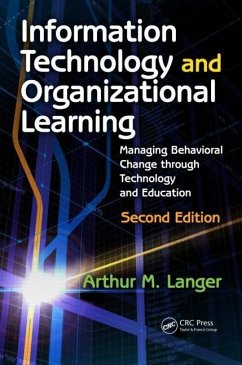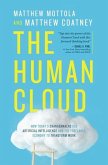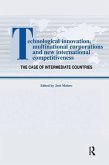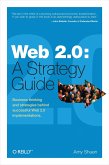Arthur M Langer
Information Technology and Organizational Learning
Managing Behavioral Change through Technology and Education
Arthur M Langer
Information Technology and Organizational Learning
Managing Behavioral Change through Technology and Education
- Broschiertes Buch
- Merkliste
- Auf die Merkliste
- Bewerten Bewerten
- Teilen
- Produkt teilen
- Produkterinnerung
- Produkterinnerung
Rev. ed. of: IT and organizational learning: managing change through technology and education. 2005.
Andere Kunden interessierten sich auch für
![The Human Cloud The Human Cloud]() Matthew MottolaThe Human Cloud18,99 €
Matthew MottolaThe Human Cloud18,99 €![Technological Innovations, Multinational Corporations and the New International Competitiveness Technological Innovations, Multinational Corporations and the New International Competitiveness]() Technological Innovations, Multinational Corporations and the New International Competitiveness30,99 €
Technological Innovations, Multinational Corporations and the New International Competitiveness30,99 €![Oracle 11i E-Business Suite from the Front Lines Oracle 11i E-Business Suite from the Front Lines]() April J WellsOracle 11i E-Business Suite from the Front Lines88,99 €
April J WellsOracle 11i E-Business Suite from the Front Lines88,99 €![The Digital Doctor The Digital Doctor]() The Digital Doctor158,99 €
The Digital Doctor158,99 €![A Necessary Evil A Necessary Evil]() Aliah D WrightA Necessary Evil35,99 €
Aliah D WrightA Necessary Evil35,99 €![Web 2.0: A Strategy Guide Web 2.0: A Strategy Guide]() Amy ShuenWeb 2.0: A Strategy Guide22,99 €
Amy ShuenWeb 2.0: A Strategy Guide22,99 €![Take Back Your Life! Take Back Your Life!]() Sally McgheeTake Back Your Life!27,99 €
Sally McgheeTake Back Your Life!27,99 €-
-
-
Rev. ed. of: IT and organizational learning: managing change through technology and education. 2005.
Hinweis: Dieser Artikel kann nur an eine deutsche Lieferadresse ausgeliefert werden.
Hinweis: Dieser Artikel kann nur an eine deutsche Lieferadresse ausgeliefert werden.
Produktdetails
- Produktdetails
- Verlag: Taylor & Francis Ltd (Sales)
- 2nd edition
- Seitenzahl: 384
- Erscheinungstermin: 10. November 2010
- Englisch
- Abmessung: 234mm x 156mm x 20mm
- Gewicht: 540g
- ISBN-13: 9780415875837
- ISBN-10: 0415875838
- Artikelnr.: 29925700
- Herstellerkennzeichnung
- Libri GmbH
- Europaallee 1
- 36244 Bad Hersfeld
- gpsr@libri.de
- Verlag: Taylor & Francis Ltd (Sales)
- 2nd edition
- Seitenzahl: 384
- Erscheinungstermin: 10. November 2010
- Englisch
- Abmessung: 234mm x 156mm x 20mm
- Gewicht: 540g
- ISBN-13: 9780415875837
- ISBN-10: 0415875838
- Artikelnr.: 29925700
- Herstellerkennzeichnung
- Libri GmbH
- Europaallee 1
- 36244 Bad Hersfeld
- gpsr@libri.de
Arthur M. Langer has more than 25 years of experience in managing the strategic development, support, and marketing of software and computer systems. His professional expertise encompasses IT strategy, outsourcing, operations management, feasibility analysis and techniques for developing and marketing systems, management of IT staff, IT cost/benefit analysis, systems selection/migration, Year 2000 implementation, computer downsizing, and software re-engineering of enterprise systems to Client/Server using Object Oriented Methods. Select clients include Prudential Insurance, Corcoran Group, Citibank, Purina Mills, NET/Thirteen, System Software Associates, Global Turnkey Systems, TIAA/Cref, France Telecom, and Buelli and Rasero (Italy's largest insurance agents). In addition to corporate consulting, Dr. Langer presents seminars throughout the world on analysis, design, and software management. Dr. Langer is Chair of Faculty and Curricular Development in the Information Technology Programs of Columbia University's School of Continuing Education and teaches courses in the MBA program of the Graduate School of Business at Columbia. A specialist in issues of distance education, mentoring, and workplace learning, he has more than 15 years of experience in adult higher education. At Columbia, he is responsible for developing overall curricular direction, as well as individual courses, for graduate-level adult education program. He is also responsible for program administration, including faculty hiring and student recruitment. As a researcher, Dr. Langer has authored various papers on information systems design and management. His current research focuses on the mentoring of adult learners and the design of technology-based curricula for corporations and universities. Dr. Langer is also the author of The Art of Analysis (Springer-Verlag, 1997; second edition 1999), used in the United States and abroad by universities and professionals in the industry. Dr. Langer holds a BS in computer science, an MBA in accounting/finance, and a Doctorate of Education from Columbia University.
1. The "Ravell" Corporation
2. The IT dilemma
3. Technology as a variable and responsive organizational dynamism
4. Organizational learning theories and technology
5. Managing organizational learning and technology
6. Digital technology platforms and the future of work
7. Virtual teams and outsourcing
8. Organizational learning
IT
and technology disruptions
9. Forming a cyber security culture
10. Digital transformation and changes in consumer behavior
11. Integrating multiple generations of employees to accelerate competitive advantage in the digital age
12. Toward best practices
13. Conclusion
2. The IT dilemma
3. Technology as a variable and responsive organizational dynamism
4. Organizational learning theories and technology
5. Managing organizational learning and technology
6. Digital technology platforms and the future of work
7. Virtual teams and outsourcing
8. Organizational learning
IT
and technology disruptions
9. Forming a cyber security culture
10. Digital transformation and changes in consumer behavior
11. Integrating multiple generations of employees to accelerate competitive advantage in the digital age
12. Toward best practices
13. Conclusion
1. The "Ravell" Corporation
2. The IT dilemma
3. Technology as a variable and responsive organizational dynamism
4. Organizational learning theories and technology
5. Managing organizational learning and technology
6. Digital technology platforms and the future of work
7. Virtual teams and outsourcing
8. Organizational learning
IT
and technology disruptions
9. Forming a cyber security culture
10. Digital transformation and changes in consumer behavior
11. Integrating multiple generations of employees to accelerate competitive advantage in the digital age
12. Toward best practices
13. Conclusion
2. The IT dilemma
3. Technology as a variable and responsive organizational dynamism
4. Organizational learning theories and technology
5. Managing organizational learning and technology
6. Digital technology platforms and the future of work
7. Virtual teams and outsourcing
8. Organizational learning
IT
and technology disruptions
9. Forming a cyber security culture
10. Digital transformation and changes in consumer behavior
11. Integrating multiple generations of employees to accelerate competitive advantage in the digital age
12. Toward best practices
13. Conclusion








